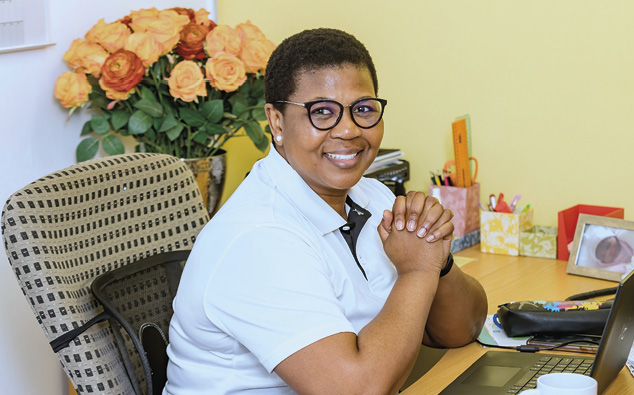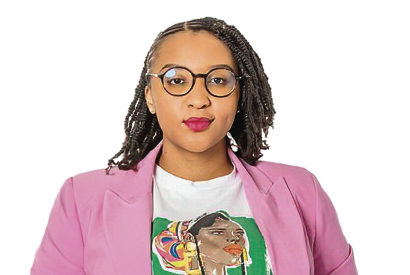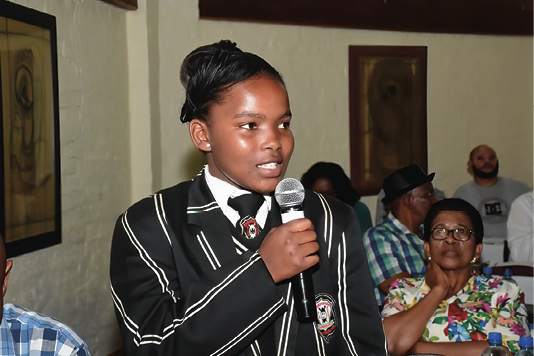
The bumb’INGOMSO project’s primary aim is to reduce the spread of HIV in East London’s Buffalo City and immediate surroundings. However, its intentional model to empower, motivate, inspire and ignite a sense of purpose among youth, alongside providing health services, has yielded incredible results: young people who are healthier, more confident, and full of belief in their own potential.”
Since 2016, the bumb’INGOMSO project has worked in Buffalo City in the Eastern Cape to reduce young women’s vulnerability by promoting leadership opportunities, improving access to youth-friendly health services, addressing gender-based violence, and linking youth to economic opportunities. The initiative empowers adolescent girls and young women to make informed, healthy choices and respond to the high rates of HIV among 15–29-year-olds.
Supported by the DG Murray Trust, bumb’INGOMSO is far more than an HIV prevention initiative—it’s become a space where young people are empowered to lead, dream and drive real change. And it is in the very heart of Buffalo City—where economic hardship and social challenges run deep—that this powerful movement is reshaping what’s possible… and it is being driven and inspired by the very youth who form part of the community and at whom the project is aimed.
“Our core mission is to prevent HIV, which as we know, South Africa is one of the countries with high prevalence, with girls and young women proving to be the most vulnerable to HIV infection,” explains Project Director Nokuthula Futwa.
“However, our work goes far beyond preventing HIV. We work with young people, especially young women, to help them see that more is possible—even in a place where poverty and unemployment are high.”
bumb’INGOMSO’s comprehensive HIV prevention strategy blends conventional methods—such as behavioural education and biomedical support—with efforts to address the deeper social and structural factors driving risk, especially among adolescent girls and young women. The programme reaches over 30,000 young people annually, operating across schools, communities and in rural areas of the Eastern Cape. However, its heartbeat is the transformative power of youth leadership.
At its core, bumb’INGOMSO doesn’t just serve young people—rather, it entrusts them with responsibility. Through youth clubs, debate programmes, leadership training and community projects, young people are being equipped to identify and solve the challenges around them.
“One of our biggest successes is small things like seeing a young person who is quiet and withdrawn suddenly becoming more vocal and able to articulate themselves through our debate program. These young women from local schools participate to the level where they represent the Eastern Cape at international events, even going on to be selected as part of the young people’s parliaments because of how they are able to articulate and express themselves, while others might find ways to serve their community through starting a community food garden,” adds Futwa.
These moments may look small on the surface, but in a place where few opportunities exist, they are proving to be deeply transformative. The programme also tackles entrenched issues such as gender-based violence, food insecurity and economic exclusion. bumb’INGOMSO partners with colleges and training organisations to build skills in a wide range of fields—from electrical work to mobile phone repairs—helping young people create livelihoods in the absence of formal jobs.
However, as Futwa points out, it’s hard work for everyone involved, and not least the young people of Buffalo City.
“You can give young people training, but if there’s no economy to absorb them, it becomes incredibly difficult. Our great challenge now is the fact that our major funding is ending. That’s the reality—we’ll need to scale down right at the time when we should be scaling up.”
The project has been blessed to have enjoyed huge funding for the past seven years through the German Development Bank KfW, in addition to its ongoing support from The DG Murray Trust. Despite the loss of so much funding and the constraints that will shackle their team, the belief in young people remains unshaken.
For Lindokuhle Msele, a Youth Empowerment Leader, the magic lies in the trust that bumb’INGOMSO’s has in the youth of Buffalo City.
“Here, leadership doesn’t depend on a job title,” she says. “Young people are trusted to lead from within their own communities. They’re not just being helped—they’re helping shape the future of others.”
Lindokuhle speaks from personal experience, having grown through the ranks herself. She believes one of the greatest impacts of the programme is how it reframes what success and opportunity can look like—particularly in a country where many young people feel locked out of progress through lack of opportunities.
“What bumb’INGOMSO teaches is that experience doesn’t have to mean sitting behind a desk. It’s about action, initiative and learning through doing—even without formal employment. That kind of growth is just as real,” adds Lindokuhle, who has become an expert in the field of youth empowerment.
This community-based model has had impressive ripple effects, with scores of young people—the very individuals who once dismissed the idea of clubs and self-development—now seeking it out. Why this sea of change in perspective and reaction? Quite simply, it’s because they’ve seen their peers—often kids from the same streets where they themselves have grown up—go on to achieve visible change for themselves and success in their lives.
“What’s special, is that mentors come from the same townships. When you see someone like you thriving, you believe you can also achieve success in your life,” says Lindokuhle.
Over time, what started as a small, uncertain programme has grown into a substantial movement. Young people have registered non-profits, launched businesses, returned to school and even shifted how their communities view youth leadership. This shift is embodied by Ahlume Kamvelihle Mangxa, one of bumb’INGOMSO’s members.
“I grew up shy and I couldn’t speak in front of people, but bumb’INGOMSO helped me discover my voice. I discovered that I was never really shy… I just needed a push in the right direction. Debate has taught us to come out of our comfort zones and that helped us because no dreams and no impact can be made to our communities while we are in a comfort zone. That is what bumb’INGOMSO did for me and now I can stand and address multitudes confidently,” says Ahlume.
Her journey has, however, been about a lot more than just public speaking—it’s been one of self-discovery and a realisation of her true purpose in life.
“I always thought I wanted to be a doctor, but through debate and critical thinking, I realised my purpose is political. I want to lead—and now, I believe I can,” adds Ahlume, who also speaks passionately about how the programme changed her perspective on health and relationships.
“They taught us about HIV, about self-care, about abstinence and protection. It’s stuff we didn’t take seriously before. Now, we understand how to look after ourselves and why it matters.”
In her words, the impact of bumb’INGOMSO is spiritual as well as practical: “They gave me light and a push. Now I know who I am.”
While the programme faces funding uncertainty, its legacy is already embedded in the young people it has empowered—young leaders who are not waiting for the world to hand them opportunity but, rather, as empowered individuals they are creating it where they stand.
“We’ve had young people start advocacy campaigns, grow gardens that feed families, fix appliances, launch clubs—all because someone believed in them,” says Nokuthula.
And Lindokuhle, reflecting on nearly a decade of watching transformation unfold, adds:
“Young people need opportunity—it’s their lifeline—and when you give it to them, they shine.”






